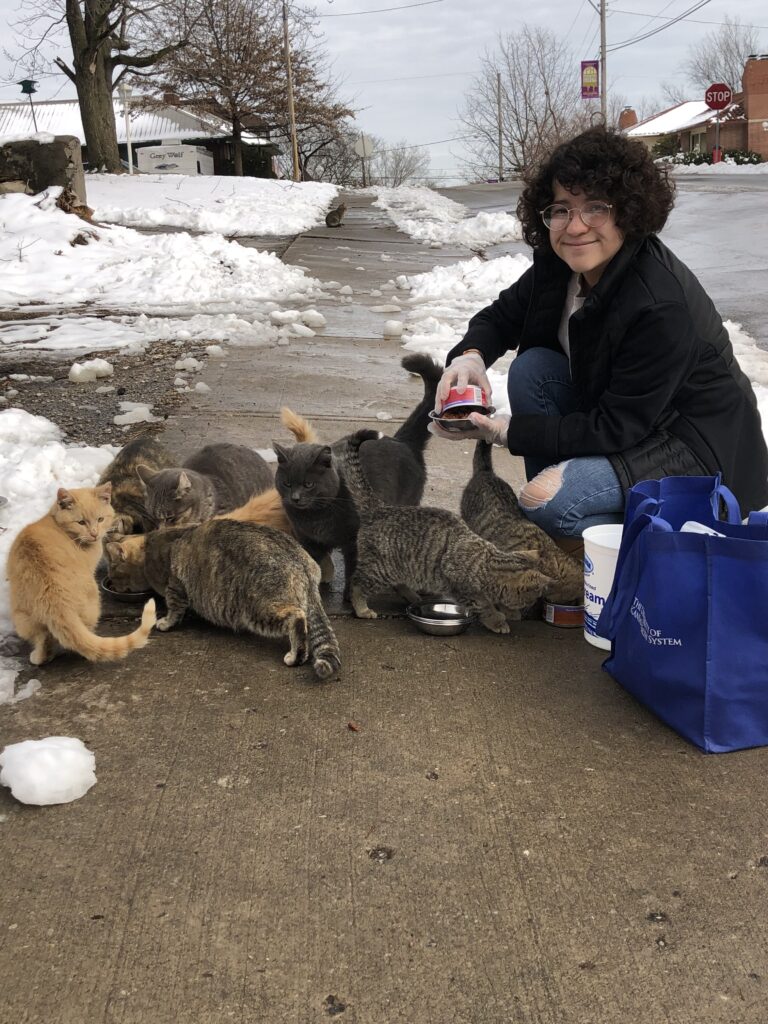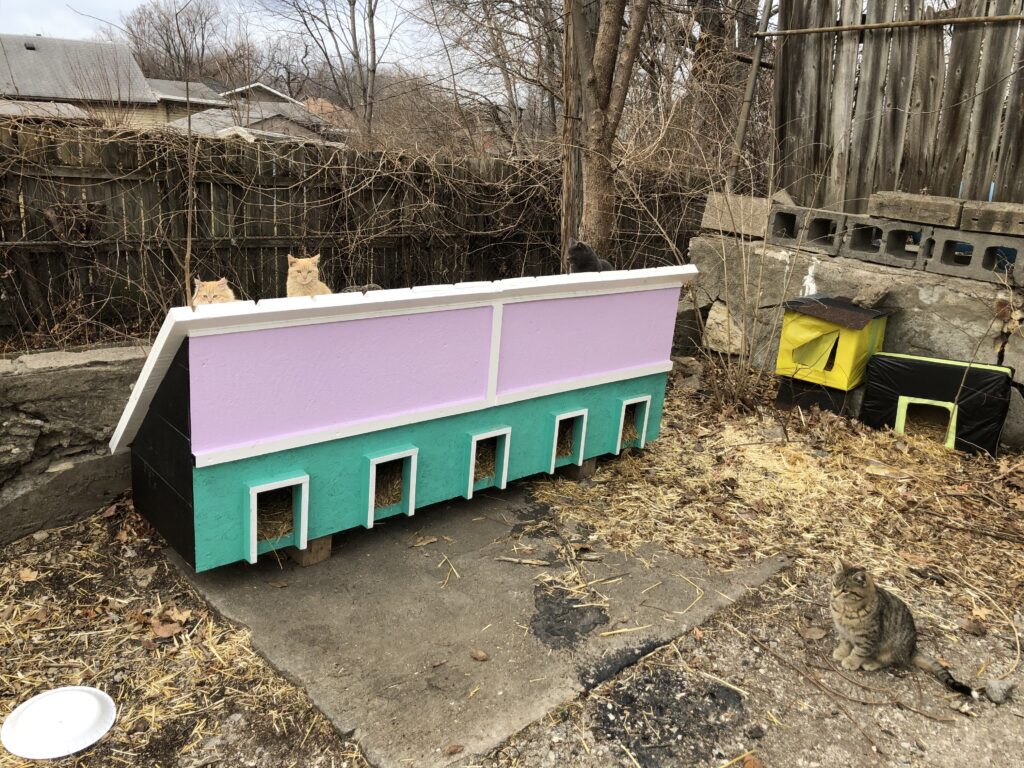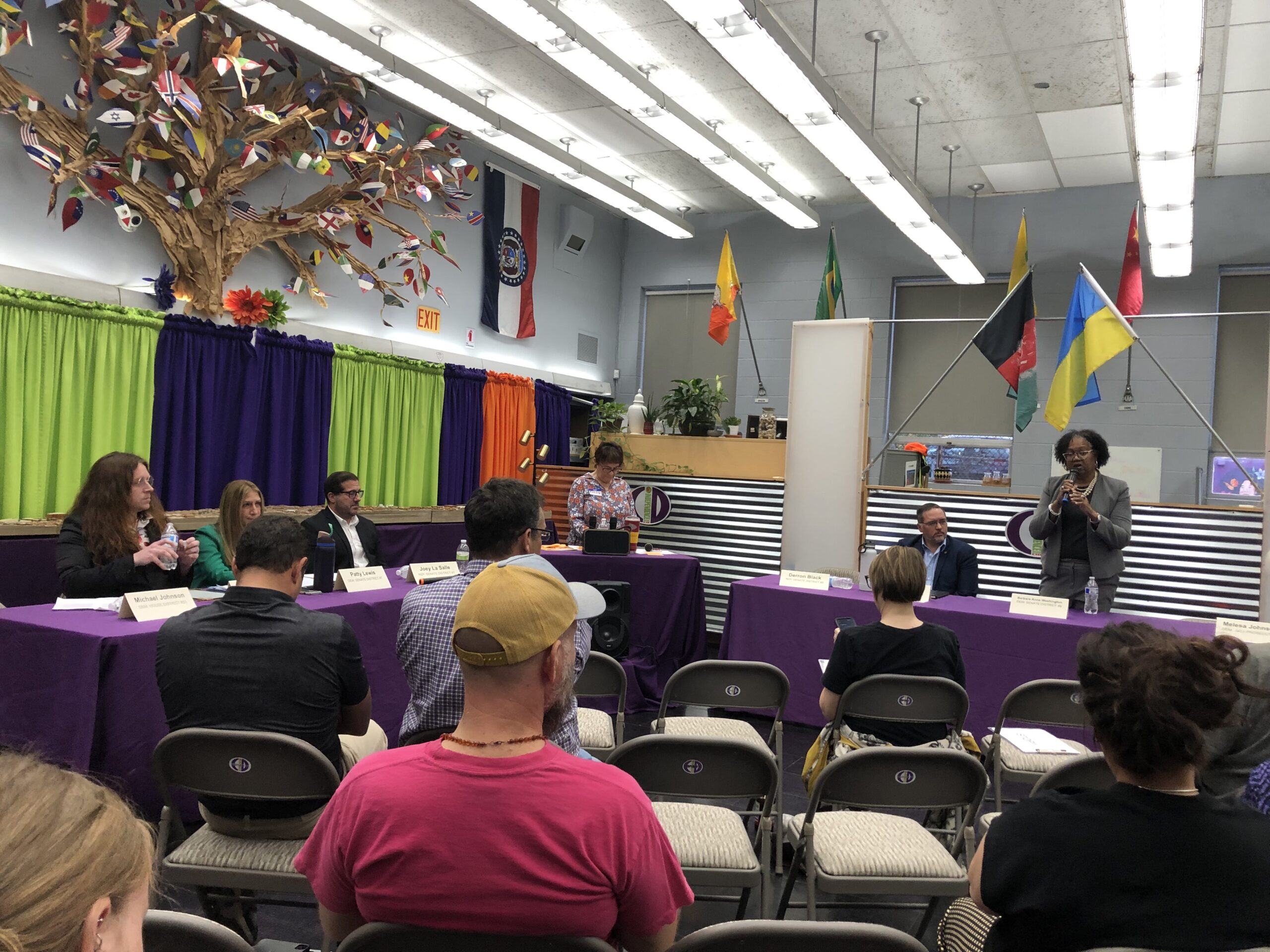
By Dorri Partain
A colony of feral cats roaming the alleys of the Pendleton Heights neighborhood has brought a group of neighbors and cat lovers together to care for them – feeding, creating shelter, and finding new homes.
Daniella Ramirez, a college student at Avila University, has three cats of her own and a busy schedule with a double major in psychology and criminology, but began feeding the colony of cats last August. As she arrives, the cats rush to greet her.
Out of her tote bag she unloads bowls, a container of fresh water, two containers of dry food, and six cans of wet food. This will feed approximately 14 cats. She feeds them morning or afternoon, depending on which shift she takes – the process is repeated twice a day.
“It might sound silly, but I like to give them all names,” Ramirez said.
She reaches out to those that will let her pet them while a neighbor, Sang, drives up and carefully parks his car in the driveway. The remainder of Sang’s driveway is where shelters for the cats have been placed. Some are boxes, weather-proofed with colorful duct tape, while the largest was recently completed by Ramirez’s brother-in-law, Joveni Payon.
After Ramirez approached him about building a cat shelter, Payon did some research.
“I looked up videos on YouTube and Google on designing a cat house that would fit a good amount of cats,” Payon said. “In my free time I like doing side projects and building furniture; I built the cat house with recycled wood and other materials from my [remodeling] job. What was bought was the insulation and straw to put inside the cat house.”

The shelter features five entry doors, a sloped roof to shed rain and snow, and is painted teal and lavender. The paint was also left over from other projects Payon has completed.
Mark Fenner, another neighbor that lives nearby on Park Avenue, has taken on the task of reducing the number of cats using TNR (trap, neuter, release). Originally from Northeast, he moved back to the neighborhood from Baltimore two years ago.
“Having been gone a couple of years, when I moved back I was amazed at the number of cats here now,” Fenner said.
He began researching how to TNR and get funding. He applied and now receives grants from Spay USA, operated by North Shore Animal League that assists nationwide to reduce the number of feral cats. Once spayed or neutered, that cat’s ear is tipped to show, once they are released, that they are no longer able to reproduce.
Fenner has been able to get 30 cats spayed or neutered, and six of those adopted out. He has taken the cats to KC Pet Project, which receives the funding directly from Spay USA. The funding helps reduce the cost, but Fenner still has contributed personally for traps, transporting the cats, and food.
Another issue the colony has faced is an individual who has been setting out poison; at least 23 feral cats have been found dead, along with local wildlife and two pets.
“It’s cruel,” Fenner said. “That’s not the way to control the population. Pets have been poisoned, too. It could be accidental, [like] someone disposing of antifreeze incorrectly, but honestly, I don’t think so.”
Ramirez said one of her colony cats, a neutered male she had named Bubbi, was poisoned last year. When she saw he wasn’t well, she took him to the vet, but it was too late and the cat had to be put down.
“It was hard,” she recalled. “My family says don’t get too attached to the cats, but, well, I do.”
One of the colony kittens has had a better outcome. When she noticed Tilly wasn’t well, she scooped her up for a trip to the vet. She had developed a respiratory infection, but has recovered with medication. She’s now staying at KC Pet Project with hopes that she’ll be adopted soon.
Ramirez has received donations from volunteers from the Plaza area who stumbled across the Pendleton Heights colony and became involved. Along with helping feed the cats, they have donated additional food and have contacted KC Pet Project and the Kansas City Police Department regarding the poisonings. While Ramirez wanted to acknowledge their contributions, for this article they preferred to remain anonymous.
Virginia Bettencourt, a Scarritt Renaissance resident who owns and is renovating two properties across the street from the colony’s main hangout, watches out for the cats as well, noting that, “They keep them well fed. The cats know who they can trust.”
In addition to food donations, Ramirez raises money by creating ceramic pieces and paintings she sells at the nearby Art Garden KC events that were held in Pendleton Heights during the summer and fall months. While caring for the colony is a passion, the goal is to find them new homes.
“I’d like them to have a fighting chance to be adopted into loving homes, especially during the freezing weather,” she said, touching a fluffy kitten and opening another can of food.
For those who would like to contribute food or adopt one of the colony cats, contact us here at the Northeast News and we’ll forward your interest to Ramirez and Fenner.

















